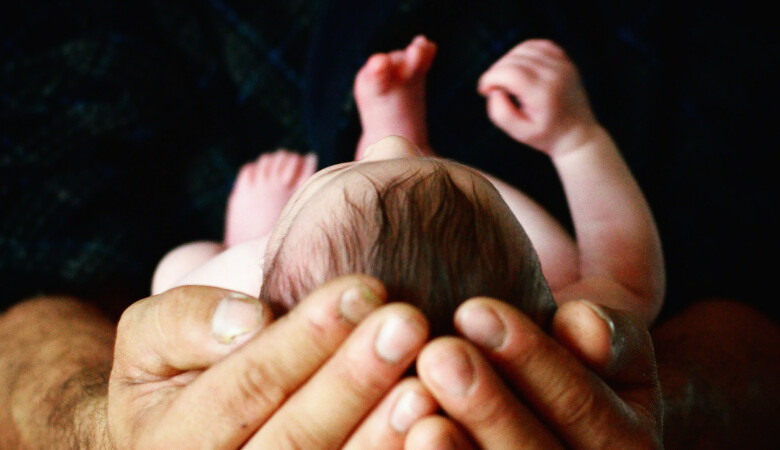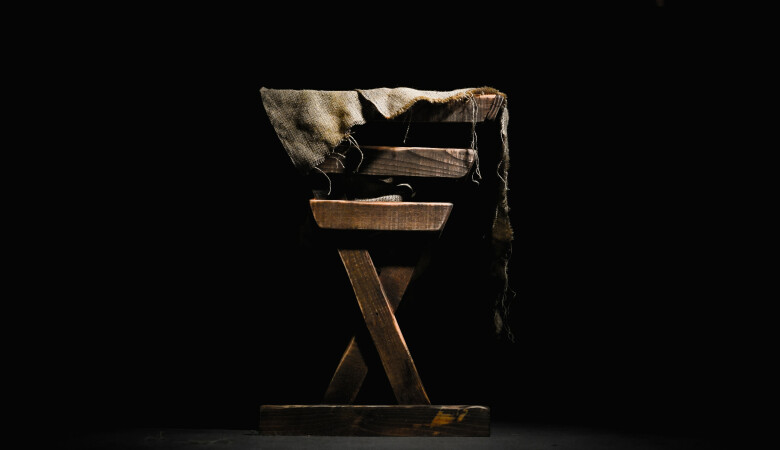Pondering the Infinite Mystery of the Incarnation
December 20, 2009 | Andy Davis
Luke 2:19
Incarnation
sermon transcript
Introduction
Christmas in Japan
Well, I'll never forget our experience, my wife and I, our two children, Christmas in Japan. What a time that was for us. We served as missionaries for two years, and we were warmly received by the Japanese people. They were very kind, respectful toward us. We taught English classes, Bible classes, we did all kinds of things and ministering there in Japan. The Japanese culture fascinated me. It bore an external similarity to America, especially urban America. There were Kentucky Fried Chicken and McDonald's restaurants. There were pizza restaurants. Pizza was expensive, $35 for a pizza; we splurged once a year and were surprised to find potato salad and niblet corn on the pizza, but it was good. Maybe not worth $35, but it was good. It's a busy, fast-paced technologically advanced electronic-saturated kind of culture. And in that way, we resonated, we're familiar with that. There were large shopping malls, similar to the ones we have here, and all kinds of things that reminded us of home. But at its core, Japan was unconverted. About 1%, maybe less than 1% evangelical, very cordial in hearing presentations of the Gospel, but very, very, very difficult to bring them to faith. It didn't take long to see through the outward veneer of the truth of a nation that desperately needed Christ. And one of the strangest parts of the year for us, at least for me, was Christmas. Because amazingly enough, there were many of the outward trappings of Christmas over there in Japan too. There would be Christmas decorations. There would be Christmas lights. There would be Christmas trees up in the public areas. There would be pictures of Santa Claus. There would even be Christmas music of the secular type, you know, like Silver Bells and Chestnuts Roasting and all those kind of songs we get saturated with, well, they were over there too. And it was a big time of buying and selling and giving of gifts, and putting those two together was just really striking for me. Here is this kind of outward kind of the trappings of Christmas, but at core, no belief at all.
Christmas in a Semi-Christian Nation
And it got me to thinking about the same dichotomy here in our own country as well. It is so easy for us to be saturated with the outward trappings of Christmas and just miss the truth, the incarnation of Christ. And I hope I wasn't looking at the future of our country - you know, 1% evangelical with all the same trappings of faith. May it never be. But we're used to the kind of secular celebrations of Christmas, the Christmas programs, It's a Wonderful Life - just about got that movie memorized, and I've said before, I think that there's almost no situation in life that can't be covered with a line from that movie. But that's a theory I haven't tested yet, but it's there. Miracle on 34th Street, The Grinch Stole Christmas and all that kind of stuff.
Where is Christ in all of this? And our semi-Christian nation also tolerates some spiritual images of Christmas less and less publicly as time goes on, but they're there, the manager scenes, the crèches, that kind of thing. And some of the songs on the radio still do mention the birth of Jesus our Savior, and we can listen to that. And some of the popular movies still center on Christ, although, I don't know that we've seen The Little Drummer Boy recently, that Claymation thing, but they still do end up worshiping Christ. But America less and less delights in the central issue of Christmas, and that is the incarnation, the enfleshment. That's what the word means of Almighty God, the physical birth of the creator of the universe. At the core, Christmas is an infinite mystery beyond any of us to comprehend. Perhaps that's why so many of us struggle to accept it. People struggle over that central stumbling block of our Christian faith, and that is the baby in the manger actually is God the creator, God the judge. And this mystery just trips the electrical circuits of the brain.
I've done some wiring in my life, you know, in the old days, when you wired up, you wired up to a fuse box, and the purpose of the fuse was that if the wires carried too much current, the fuse would go before the wires would, saving your house from a fire. Nowadays, they use circuit breakers, they're just like switches and they just trip over. You've probably done it yourself. Recently, I was using a table saw and the thing just stopped and found out that my wife was using the hair dryer at the same time on the same circuit, so we just hadn't communicated with each other. One or the other, but not both, can't do both the table saw and the hair dryer on the same circuit, and so the circuit breaker went over. Thank God for circuit breakers and not fuses. But the fact of the matter is that's what the incarnation is like, too much concept, too much truth flowing through these feeble minds for us to accept, and it just goes over. And I wouldn't mind actually tripping some of your circuit breakers this morning. I would like to cut through the blasé, heard it all before, he said, alright, Luke 2:1-20. Well, it gets even better. Next week, I'm preaching on Matthew 2:1-12. So, we get these same passages. But I tell you, there is yet more truth to flow through these concepts into our minds. "The word became flesh and made his dwelling among us." And I tell you that flesh and blood cannot naturally accept that truth. We cannot naturally understand it, we must have supernatural assistance from the Holy Spirit in order to gain it. Charles Spurgeon put it this way:
“As Jesus Christ is a child in his human nature, he is born, begotten of the Holy Ghost, born of the Virgin Mary. He is as truly-born, as certainly a child, as any other man that ever lived upon the face of the earth. He is thus in his humanity a child born. But as Jesus Christ is God’s Son, he is not born; but given, begotten of his Father from before all worlds, begotten — not made, being of the same substance with the Father. The doctrine of the eternal affiliation of Christ is to be received as an undoubted truth of our holy religion. But as to any explanation of it, no man should venture thereon, for it remaineth among the deep things of God — one of those solemn mysteries indeed, into which the angels dare not look, nor do they desire to pry into it — a mystery which we must not attempt to fathom, for it is utterly beyond the grasp of any finite being. As well might a gnat seek to drink in the ocean, as a finite creature to comprehend the Eternal God. A God whom we could understand would be no God. If we could grasp him he could not be infinite: if we could understand him, then were he not divine.”
Why agree with what Spurgeon says? It's an infinite mystery, but yet for all of that, have we not been given the mind of Christ? And how are we to use the mind of Christ, why not on this? Meditate on the incarnation of Christ. Let's think more deeply about it than we have before. Let's probe this mystery.
The Foundational Miracle: The Incarnation
The Mystery is Great
This is, I believe, the foundational miracle of Christianity, the incarnation. The Apostle Paul puts it this way in 1 Timothy 3:16, "Beyond all question, the mystery of Godliness is great: He appeared in a body." The Apostle Paul, I tell you, is not given to exaggerations. He was given to receiving and transmitting incredibly deep things which he had gotten from the Lord. He had an extraordinary mind and could reason things through with astonishing clarity and profoundity. Festus thought, his great learning had driven him insane, but it hadn't, he just had great learning. He was a genius, a doctrinal genius. And the Apostle Peter spoke of the complexity of Paul's thoughts and his Epistles in 2 Peter, he said his, Paul's "letters contain some things that are difficult to understand." Very, very deep thinker. God showed Paul surpassingly great revelations of the future life, of paradise, things that man is not permitted to talk about. He showed him incredible things, and yet for all of this, Paul seemed to think the greatest mystery of all, this mystery of Godliness was he appeared in a body. It's just too difficult for us to comprehend, beyond all question, the mystery of Godliness is great. He appeared in a body.
J.I. Packer: This is the Foundational Miracle
J.I. Packer in his classic Knowing God said, "This is the foundational miracle of Christianity." As he's discussing the challenge that the Christian faith poses to what he calls thoughtful people around the world, thinking people, he talks about the various difficulties that people have to overcome to be Christians. He says, Christianity presents unbelievers with the challenge of accepting the atonement, the atoning work of Christ. The fact that the death of Jesus of Nazareth on a Roman cross 2000 years ago actually forgive sins today. That's a challenge for people. It's difficult to accept. Or take the resurrection; how could a man be dead, how could Jesus be dead, and on the third day be physically raised from the dead? There's never been anything like it. You can't prove it in a scientific laboratory. It's difficult to accept. Or what about all of the Gospel miracles? The feeding of the 5000 from five loaves and two fish? There is such a thing as the conservation of matter; things just don't pop up out of nowhere. Well, they do, if you're God, of course; God creates out of nothing, but these are difficult miracles to accept. How Jesus could spit in the ground and make some mud with his saliva and smear it on a blind man's eyes and he could see? It just doesn't make any sense at all. Or the raising of a man that was dead after four days of being in the tomb? Very difficult to accept these things.
But J.I. Packer says, "None of these compare with the real difficulty, the supreme mystery of all with which the Gospel confronts us, and that is the mystery of the incarnation." Packer says this, "It lies not in the Good Friday message of atonement or the Easter message of resurrection, but in the Christmas message of the incarnation. The really staggering Christian claim is that Jesus of Nazareth was God-made man-… so that Jesus of Nazareth was as truly and fully divine as he was human." "Here are," says Packer, "Two mysteries for the price of one. The plurality of persons within the unity of God," we call that the Trinity, "Plus the union of Godhead and manhood in," one person, "the person, Jesus Christ. It is here in the thing that happened at the first Christmas that the profoundest, the most unfathomable depths of Christian revelation lie." "God became man, the divine son became a Jew, the Almighty appeared on earth as a helpless human baby, unable to do more than lie and stare and wriggle and make noises, needing to be fed and changed and taught to talk like any other child. And there was no illusion or deception in this, the babyhood of the Son of God was a reality. The more you think about it, the more staggering it gets."
So, Let’s Stagger Our Minds on this Today!
So let's stagger our minds today, shall we? Let's go ahead and be staggered with it, let's ponder the imponderable, and consider the inconsiderable, plumb the depths of infinite mystery, even though we know we're going to run out of string before we get to the bottom. Let's just think and let's think some more and think even more after that.
The Facts of the Incarnation: Luke 1-2
A Word About Mary
And in this, I want to follow the example of Mary, the mother of Jesus. She was a great thinker. She was a ponderer. Look at Verse 19 of Luke 2, "Mary treasured up all these things and she pondered them in her heart." So we're going to follow her example. And before we go on, I just want to say a word about Mary. I was raised Roman Catholic, I was in the Catholic Church until I was converted. I was an altar boy, and I tell you, that the Catholic Church has done us a disservice concerning Mary. First of all, they teach four significant errors concerning Mary. The four significant things they assert about Mary, which I deny, because they're not found in the Bible, they're in contrary to Christian theology. First of all, they teach and have taught since the middle of 19th century, the immaculate conception of Mary. By the way, all you Protestants who see the words immaculate conception, that's not talking about Jesus, it's talking about Mary and that she was amazingly conceived free from original sin. And the Pope told us that, because we had no other way of knowing it. Immaculate conception of Mary led on secondly to the general sinlessness of Mary, she never committed any sin in her life. There was no sin in her life. She was a sinless woman. Thirdly, the bodily assumption of Mary, that at the end of her life, she was physically raised up into heaven and went into heaven with her body intact. The bodily assumption of Mary, they waited until the 20th century to tell us that one, about 100 years after the immaculate conception teaching. And then fourthly, that Mary is in some sense the Mediatrix, the Queen of Heaven. Somewhat interceding for us in a way, very similar to Jesus. Four things I think that sadly have put distance between most Protestant Christians, Evangelicals and Mary as a Godly woman, a role model, somebody that we should imitate in many respects. And that's what I want to follow today, we can easily overreact, just like Protestants have overreacted on the Lord's Supper; just because we don't believe in the doctrine of the immediate presence of Christ, doesn't mean that we should minimize the Lord's supper. I don't. I trust that God is going by his Spirit make an incredible time of worship. It's not a mere Memorial, and neither was Mary a mere woman, she's a role model, and we ought to follow her, and in this way. I'm going to. So, we should follow the way she treasured up things and pondered them in her heart.
Preparation for the Mystery: Luke 1
Now, let's go over the facts of the incarnation, you heard them before, but they're foundational. Ours is a historical faith. And let's tell the story again, you've already heard it read, but I'm going to go back actually starting at Luke 1, "When the Angel Gabriel appeared to Mary and greeted her, 'Hail O favored one, The Lord is with you.'" And you remember how Mary reacts at that time, she's troubled by the greeting. I would have been troubled by the angelic presence. She was, I think probably, but troubled by the greeting, especially, in what sense am I favored? In what sense is the Lord with me? That kind of thing. She was such a thinker, pondering it. And then the angel said these incredible things, "Do not be afraid, Mary, you have found favor with God. You will be with child and give birth to a son, and you are to give him the name Jesus. He will be great and will be called Son of the Most High. The Lord God will give Him the throne of his father, David, and He will reign over the house of Jacob forever. His kingdom will never end." Then the pondering, the thoughtful one, Mary says, "How will this be? I'm a virgin." She's wondering, how it's possible? The angel answered, "The Holy Spirit will come upon you and the power of the Most High will overshadow you. And so, the Holy One to be born will be called the Son of God." Certainly plenty for Mary to ponder at that point. Holy Spirit, Son of God, sit on David's throne forever. That kind of thing.
Well, then she takes a trip to visit her cousin Elizabeth and Elizabeth greets Mary in a loud voice, "Blessed are you among women, and blessed is the child you will bear. But why am I so favorite," said Elizabeth, "that the mother of my Lord should come to me? As soon as the sound of your greeting reached my ears, the baby in my womb leaped for joy. Blessed is she who has believed that what the Lord has said to her will be accomplished." What a phrase, the mother of my Lord. Why am I so favored? Mary responds with that great statement, the Magnificat, "My soul glorifies in the Lord and my spirit rejoices in God, my Savior, for He has been mindful of the humble state of his servant. From now on, all generations will call me blessed, for the Mighty One has done great things for me - holy is His name."
The Orchestration of History: The Census
Well, that just sets the table, but the time has come in Luke 2 for the actual birth of Jesus. And you know very well the events surrounding that, in Verse 1-3 Luke 2, "In those days, it says, Caesar Augustus issued a decree that a census should be taken of the entire Roman world. (This was the first census that took place while Quirinius was Governor of Syria.) And everyone went to his own town to register." We've noted before the sovereignty of God over kings, the hearts of kings. In the Book of Proverbs, we saw that the king's heart is like a water course, in the hands of the Lord, He directs it whichever way he pleases. Caesar Augustus doesn't have any intention of fulfilling the prophecy in Micah that the Messiah be born in Bethlehem; he's just after troop allocations and profit, that's what he's looking for, I think. But whatever his motives were, God was overruling him and orchestrated this.
Mary and Joseph Travel to Bethlehem
And I think it's obvious that Joseph and Mary wouldn't have presumed, I think, to make the trip to Bethlehem unless they were directed to go. And God could have commanded them to go by an angel, but instead God worked providentially, so that they had to go. And so they went to Bethlehem, so that the Messiah would be born in fulfillment of prophecy. "Joseph went up," it says in Verse 4-5, "from the town of Nazareth and Galilee to Judea, to Bethlehem, the town of David, because he belonged to the house in line of David. And he went there to register with Mary who was pledged to be married to him when he was expecting a child." Either way it would have been effective with Joseph, he's an obedient man, and if God had sent an angel as he would later to tell him to go to Egypt, he would have gone. But instead God chose to work providentially, it worked just as effectively. God knows what he's doing and what means to use, and so they went.
No Room in the Inn
And you know very well, very famously that "there was no room at the inn." I'm certainly hoping the inn keepers in heaven, we get to talk to him about all that. John Piper sometime ago did a poem in which he surmised that the innkeeper might have had a baby son that was slaughtered by Herod's troops after that. We have no way of knowing anything like that. But we know this, that Joseph and Mary brought Jesus to a stable to where animals are kept so that the son of God would be born in abject poverty. While they were there, Verse 6-7, "the time came for the baby to be born, and she gave birth to her firstborn, a son. She wrapped him in cloths and placed him in a manger."
Shepherds Come to Worship
And then there were these shepherds, the shepherds that were out in their fields, living in the fields nearby, keeping watch over their flocks at night and suddenly, an angel of the Lord appeared to them. And the glory of the Lord shone around them and they were terrified. You can imagine what that would have been like. We are so used to bright lights at night because of electricity and all that, but I've been to rural countries. I've been to Pakistan, and I've been to Kenya and other places out in the country where there is no electricity, and so once the sun goes down, people go to bed. It's dark. And so suddenly, the glory of the Lord just cuts through that dark night, and the angel appears and the shepherds are terrified. And the angel said to them, "Do not be afraid. I bring you good news of a great joy that will be for all the people. Today in the town of David, a savior has been born to you. He is Christ the Lord. And this will be assigned to you, you will find a baby wrapped in clothes, lying in a manger." And suddenly, this heavenly host appeared, Heaven was open.
I wonder what would be like for us to have the vision that Elisha and his servant had and heaven would just stand open, or that Stephen had right before he died. "Look, I see heaven open and the Son of God, standing at the right hand of the Mighty One." But that night, the shepherds had a vision like that, and this army of angels comes down, praising God, giving glory to God, saying, "Glory to God in the highest and on earth, peace to men on whom His favor rests." Well, the shepherds, of course, took the message to heart, they went to see Jesus, the angels left them and went back to heaven. And "the shepherds said to one another, 'Let's go to Bethlehem and see this thing that has happened, which the Lord has told us about.' And so they hurried off and found Mary and Joseph and the baby who was lying in the manger." Now, reading between the lines, I really do believe that they told Mary everything that the angel had said to them. I think that this whole account was coming from Mary to Luke as he wrote it down, as he was investigating carefully from the beginning, everything that happened and in the life of Jesus. And I think Mary was definitely one of his sources. I'm not saying it was impossible for Luke to have talked to one of the shepherds himself. Maybe so. But I think it's well within reason, that the shepherds related to Joseph and Mary, what the angels had said and what the angel had told them concerning this baby. And when they had seen the baby, the shepherds spread the word concerning what have been told to them about this child. I would say beginning with Mary and all who heard it, were amazed at what the shepherds said to them. And they "returned, glorifying God and praising God for all the things that they had heard and seen, which were just as they had been told." So those are the facts of the case.
The Pondering Heart of Mary: Luke 2:19, 51
Mary Treasured
You've heard it before, but now I want to zero in on the pondering heart of Mary. One thing I've noticed as I trace across the early chapters of Luke and just the whole nativity stories, is how many messengers God sends to Mary to instruct her concerning what's happening to her and who Christ is. Of course, Gabriel was the first, but almost certainly, we'd imagine Joseph would have related what the angel said to him, and these Shepherds coming, and some information today in the city of David, "A savior has been born, who is Christ the Lord," and, "Glory to God and peace on earth, to men on whom His favor rests," relating to that. And of course, there was Simeon who said some specific things to Mary. And there was Anna as well. All of these messengers coming, all of this flow of truth, flowing into the heart of Mary. And what is she going to do?
Well, we look again at Verse 19, "Mary treasured up all these things and pondered them in her heart." And again, much later in this the same chapter, in Luke 2:51, it says, "But his mother treasured all of these things in her heart." Spurgeon said this about the pondering of Mary, "She wondered, she did more, she pondered. You will observe that there was an exercise on the part of this blessed woman, of the three great parts of her being. Her memory, she kept all of these things. Her affections, she kept them in her heart. Her intellect, she pondered them, considering them, weighing them, turning them over, so that memory, affection and understanding were all exercised about these things. We delight to see this in Mary, but we are not at all surprised. When we recollect that she was, in some sense the most concerned of all on earth, or it was of her that Jesus Christ had been born. Those who come nearest to Jesus and enter the most closely into fellowship with him, will be sure to be the most engrossed with him. Certain persons are best esteemed at a distance, but not the savior. When you shall have known Him to the very full, then you shall love Him with the love that passeth knowledge. You shall comprehend the heights and depths and lengths and breadths of His love. And when you do so, then your own love shall swell beyond all length and breadth, all height and depth. This birth most concerned Mary, and therefore she was the most impressed with it." Basically, what Spurgeon is saying there is, the closer you get to Jesus, the more you're going to think about him and be consumed with him. And so if your heart is cold toward him, dear friends, let's get closer to him. It's a journey of the mind and of the heart of the memory, just like it was for Mary by faith.
So first, it says that Mary treasured. Actually, twice it says that Mary treasured these things in her heart. To treasure means to take something up as though it's precious because it is. And to some degree, I think it means to protect it. This is a destructive world we live in. Jesus said, "moth and rust destroy and thieves break in and steal." So precious things have to be protected, and so Mary treasured these things. She protected them. The events surrounding Jesus's birth, the significance of that birth, the words that were spoken to her, all of those things. Now, even a natural birth is treasured by a mother. Amen?
Many of you have had the privilege of being mothers and you have given birth. And I guarantee you, you remember more about those details than your husband does. It's been proven, it's true. I still am amazed at the things that my wife remembers about the birth of each of our five children. They're just details that women hold on to. The smell of the newborn skin, the feel of their hair, the sounds that they make when they're nursing for the first time, what it was like, the first time you heard your baby cry, swaddled your baby, first time you wrapped that little baby up, first little outfit you dressed the baby in. All of these are just normal matters, there's nothing supernatural here. I know, I know, everybody says, "Every birth is a miracle." Well, as a theologian, I'm a little more precise on miracles, okay? And a miracle that happens four times every second, 133 million times a year? I don't call that a miracle. It is the goodness of God; without God's activity, it wouldn't happen. Yes, but it's not a miracle. Jesus's birth was a miracle. And yet, for all of that, the point I'm making is that mothers just naturally remember those things. They treasure them up. But Mary had far more to treasure than an average or a normal mother because the birth was so significant and so supernatural.
I just imagine what it was like for her as she lay laid there, pain subsiding, Jesus over there, perhaps sleeping in the manger. Joseph probably asleep, I don't know. But she's awake and she's treasuring, she's pondering these things, thinking about everything. All of the things I've covered with you. Luke 1 and 2. What the angel Gabriel said, "The son of God, the son of David." How can that be? "He will reign on David's throne forever and ever. Of His kingdom, there will be no end." What does that mean? Just the thoughts. "The Holy Spirit will overshadow you, and the power of the Most High will come upon you." And so it has happened now. She knew no man, even at that point. Never been with a man. And yet she had this baby. She knew the truth. "Today, in the town of David, a savior has been born for you." A savior. She knew that God had saved her. She said it in her own Magnificat. She give thanks to "God, my savior." She knew she was a sinner. And today a savior has been born for you in the town of Bethlehem, and the holy angel, the glory, the angelic army going up into heaven, all of that, pondering these things, treasuring them.
I think as she lay there, she must have looked over at whatever available light there was, and maybe the magi are coming soon. I don't know, we'll talk about that next week. But maybe there was a supernatural starlight that was there, I don't know. But perhaps she looked over at the face of Jesus, saw him. She protected those things, she protected them, she treasured them, she protected those memories. Protected them from corruption. Sin corrupts, and so perhaps already, Satan tempting her toward a certain kind of pride, which would have been sinful. She's not going to give into that, she's just a humble handmaid of the Lord. The Lord could have picked any woman. She knows that, and so she's going to protect those thoughts and protect her memories from trivializing conclusions, from thinking that she could figure out all of these things. She knew is unsearchable mystery.
And in years to come, Mary would have to protect those treasured thoughts from all manner of Satanic attack. Her virtue would be questioned openly. Aren't we right, they said to Jesus, in saying that you're a Samaritan? You have a Samaritan father. Your mother was an immoral woman. Illegitimate birth and all of that, hanging over her. Her role would be attacked in question, Satan would whisper evil insinuations into her mind, Simeon had told her that a sword would pierce her own soul. And she would have to protect all of these memories. And faith comes from hearing. And she would go over the words and her faith would be buttressed by what she had heard from the angel and all of these other sources. And she would go back to them again and again.
Mary Pondered Them
So she treasured these things. She also pondered them. The Greek word literally means to throw together. Kind of like, I'm sure a lot of you folks have done some Christmas cooking and some Christmas baking, you've got all the ingredients out and you have to mix them together. You don't serve them separately. I've never eaten baking soda separately. I don't think I ever will. I guess you could do it as a medicine, maybe I've done that, but not as a Christmas confection. We need these things mixed together. And so what she does, is she takes these different things and mixes them together. She throws them together in her mind. Ponders them. This little baby is fully human; she can see it's little chest rising and falling. Maybe she did what I always do with newborns, is put your finger inside their little fingers, and then just feel that little way they squeeze. Maybe that comes later in development, maybe Jesus was a special baby and he squeezed that very night, who knows? I'm thinking how feeble is the hand of God here? This is the hand that scattered the stars. And just to feel that he's clearly fully human and yet, Son of God.
"Hear, O Israel! The Lord our God, the Lord is one." How does that work? Son of God. God the Son. "You shall worship no other gods before me." Was Mary to worship? The shepherds did. The magi would. Is Mary going to worship her own son? She put these things together, pondering them, thinking them through, and I think it probably just went on from there, got even more perplexing and amazing and astonishing as time went on. Later in Luke 2, Jesus, 12-year-old boy, gets away from Joseph and Mary. Bad moment in parenting, right there. Bad moment. Here, I entrust the Son of God to you and look what you do, don't even know where he is. I find that story encouraging, by the way, don't you? Just that they didn't know where Jesus was for multiple days. Comforting to me. And then they go back and there he is sitting at the feet of these learned men of the scriptures, and he is asking them questions that they can't answer. And his questions show a depth of understanding, and I think we have later reflected in the gospel, some of the kinds of questions Jesus asked and no one had an answer. How could David be his son, if he calls him Lord? That kind of thing. Maybe at age 12, he's already asking those kinds of questions. And they're astonished. You remember how it was. "Jesus grew in wisdom and stature and in favor with God and men." And Mary had been watching all of this, and there's this 12-year-old boy now, just stumping the experts with these questions. And "When his parents saw him, they were astonished, and his mother said to him, 'Son, why have you treated us like this? Your father and I have been anxiously searching for you.' 'Why were you searching for me?' He asked, 'Didn't you know I had to be in my Father's house?' But they did not understand what he was saying to them. Then he went down to Nazareth with them and was obedient to them, but his mother treasured all these things in her heart." So Mary's whole life was given to protecting and pondering the events.
And what did Simeon mean when he said, "A sword will pierce your own soul too"? Well, Mary would have to wonder about that all the time that Jesus was growing older. And then when he began his ministry and the hatred started to rise, perhaps she started to know where it was heading and maybe she listened to what he said, that he would be betrayed into the hands of men, and that he would be killed by the Gentiles and on the third day, he'd be raised to life. That those little hands had come to be nailed to a cross, that the blood that flowed through his veins, human through her humanity, would be shed for the sins of the world. And a sword will pierce your own soul too. I don't think it's just a stretch to say that happened when she watched her own son die. Standing there at the foot of the cross, watching him die. But that was in the end of the story. Amen? She was an eye witness of the resurrection. She was there in Acts Chapter 1 in the upper room, waiting for the Holy Spirit to come. Just a disciple. Just a disciple. In the past, we knew Jesus in a fleshly way. In the future, we know him that way. No longer, yes. She is worshipping her own son right now. That matter has been resolved. Yes, you will worship your own son. But she was there to see it all.
In Acts Chapter 1, it's interesting; they were looking for a replacement for Judas, and the requirement was they were looking for someone who had been with them the whole time. The Lord Jesus went in and out among them, beginning with John's baptism and on until the resurrection, for one of them must be a witness with them of the resurrection. Mary had better credentials than that concerning watching Jesus's life. She had seen him from the very beginning, right on through. She was an eyewitness of everything. She had seen all of that. And she studied his life. And she was treasuring and pondering those things until the day she was taken up from her earthly life by death and received the glorification of her soul promised in the Gospel. And no, she's not the queen of heaven. She's not. She's a redeemed sinner, and she's up there in the presence of God. So what application can we take from this? How do we follow Mary's example?
Application: Four Holy Works in this Nativity
Ponder and Treasure Christ in your Hearts Like Mary
Well, there are four holy works in this birth story. First, ponder and treasure Christ in your own hearts. Let's start there. There's more to learn. I'm going to talk much more about that next week when we talk about the idea of epiphany. There's more to learn about Jesus. So protect what you already know from attacks. Treasure and protect from materialism, from busyness, from secularism, from sin. Protect the thoughts of Jesus in your own mind. And ponder the Christian message, the Christmas message. Son of man and son of God, "Jesus grew in wisdom and stature and in favor with God and men." Go ahead and try to figure out how someone can be omniscient and not know something. Go ahead and ponder that, I don't know how that happens. It's inconceivable, but Jesus was God and learned things and grew.
Pursue Christ as the Shepherds Did
Secondly, we need to pursue Christ, as the shepherds did, as Mary did all her life, pursue him. We can't do it physically, but in our hearts, pursue him. Go after Christ at Christmas time, go after Jesus. And I want to speak a tender word to those of you that are here that are unconverted. I already prayed for you, but I want to urge you. Pursue Christ. If you seek me, you will find me. If you seek with all of your heart. Seek for Jesus in the midst of all of this. Danger of preaching a sermon on Mary is you think too much of Mary. Don't think too much of Mary. I'm just urging you to ponder like she did. What was she pondering? She wasn't pondering herself. She was pondering Jesus, seek Him. Jesus died on the cross, his blood was shed so that your sins could be forgiven. Trust in Him. It's not hard, you don't have to do great works, you do have to go on great pilgrimages. Just trust in Jesus and He will forgive all of your sins. Ask Him to do it. Pursue Christ. And if you're a Christian, I say, pursue Him some more. Pursue Him more and more. Could it be that if there's a deadness and an apathy in your heart, it's because you stopped pursuing Jesus. Seek Him while He may be found, seek Him now.
Worship Christ
Thirdly, worship Him. Yes, we know we need to worship Mary's son. We need to worship, not because he's Mary's son but because he's the a son of God. Let's get down on our knees and worship. Let's think and let thinking go on into worship and say, "You are great, Jesus. Your love is great. Your person is great, I magnify you, I exalt you." Let's just worship Him.
Spread the Story Abroad: As the Shepherds Did
And fourth, like Mary did with Luke and others I'm sure, and like the shepherds did, they spread the story, the word concerning what had been told to them. Let's spread the story abroad. It's really easy to do this time of the year. I'd like you to think a year from now, it's easy to do any time of the year. Let's pray for that. Shall we? It's easy to talk about Jesus any time of the year, but the Lord hands you some freebies at this time of year, if you have a hard time getting into spiritual conversations, that is settled. Just talk about Christmas. What do you think about Christmas? What are some of your Christmas traditions and holidays? And it's not a long step from there to Jesus. Let's proclaim him as the shepherds did and as Mary did. Close with me, if you would in prayer.






























